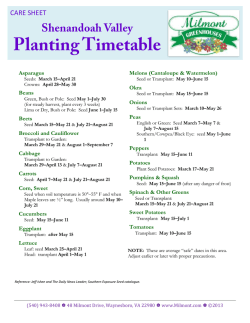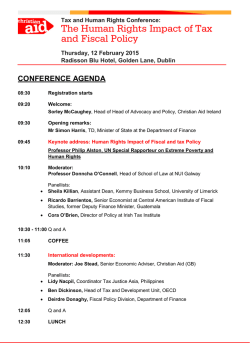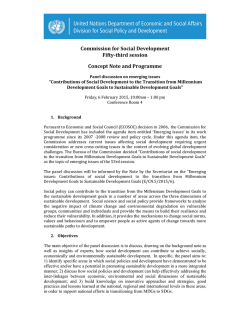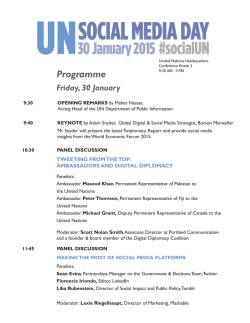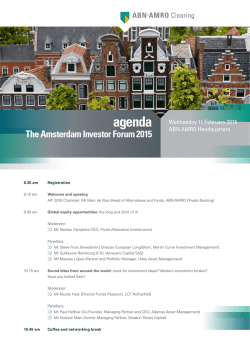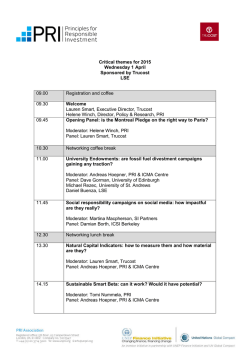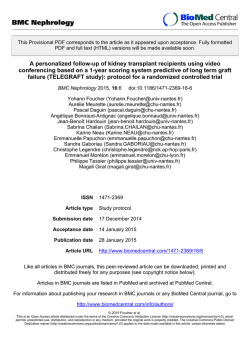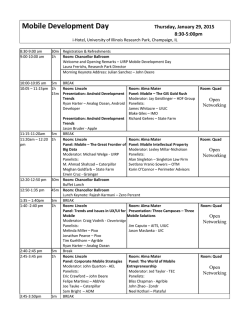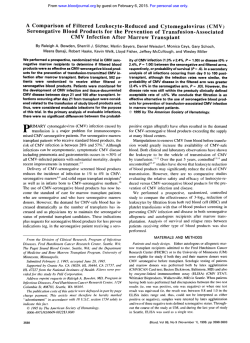
TUESDAY, APRIL 21, 2015 WEDNESDAY, APRIL
TUESDAY, APRIL 21, 2015 4:00PM-7:00PM EARLY REGISTRATION WEDNESDAY, APRIL 22, 2015 7:00AM-12:00PM–PLENARY SESSIONS 7:00AM-4:30PM REGISTRATION DESK OPEN 7:00AM-8:30AM OPENING OF EXHIBIT HALL AND CONTINENTAL BREAKFAST WITH EXHIBITORS Kidney Paired Donation (KPD) Session overview - TBD 7:00AM-8:00AM Mark Aeder, M.D. Associate Professor of Surgery, University Hospital of Cleveland, OH Vice Chair, OPTN/UNOS Kidney Transplantation Committee Ruthanne Leishman, RN, M.P.H. KPD Program Director, United Network for Organ Sharing (UNOS), Richmond, VA Moderator: James Pittman, RN, M.S.N. Welcome to the 23rd Annual United Network for Organ Sharing (UNOS) Transplant Management Forum 8:00AM-8:20AM Amy Peele, RN Chair, UNOS Transplant Administrators Committee OPTN/UNOS President’s Address 8:20AM-9:25AM Carl Berg, M.D. Medical Director of Abdominal Transplantation, Professor in Medicine, Duke University Health System, Durham, NC Moderator: Amy Peele, RN 9:30AM-10:00AM, Break With Exhibitors Transplantation Global Perspective: Where Are We? Where Are We Going? Session overview - TBD 10:00AM – 11:00AM Nancy Ascher, M.D., Ph.D. Professor and Chair, Department of Surgery, University of California San Francisco Isis Distinguished Professor in Transplantation Moderator: Amy Peele, RN Vascular Composite Allograft (VCA) Transplants: Results That Changes Lives Hear a brief overview of where we are as an industry with VCA followed by national data as well as an overview of the new UNOS VCA policies. You’ll be treated to a touching story of how a VCA transplant changed the lives of two very special women. You do not want to miss this session! Helen Nelson, RN, B.S.N., CCTC, CPTC Vice President, Organ Donation Services, New England Organ Bank, Waltham, MA 11:00AM-12:00PM Carmen Blandin Tarelton Face Transplant Recipient, Thetford Center, VT Marinda Snow Righter Donor’s Daughter, Cambridge, MA Moderator: Mike Seely, RN, M.S., CPTC 12:00PM–1:00PM, Lunch With Exhibitors 1:00PM–2:00PM, BREAKOUT SESSIONS I Crash Course for New Transplant Administrators This interactive session is relevant to new transplant administrators. The following key success factors will be reviewed and discussed. Regulatory compliance and oversight – CMS, OPTN, TJC Operational best practices including human resources requirement. Building relationships with surgical and medical directors, and OPO and medical center executives Basics of strategic planning Quality oversight and improvement – building and maintaining program’s stability Transplant 101 Amy Peele, RN Chair, UNOS Transplant Administrators Committee Gene Ridolfi, B.A., RN, M.H.A. Program Administrator of the Transplant Center & Mechanical Circulatory Support Program, Barnes-Jewish Hospital, St. Louis, MO Moderator: Melissa Roberts, M.S.N., RN, CPTC Transplant 201 Aligning Incentives: Models for Surgeon/Physician/Hospital Enterprises that Create Shared Goals/Histocompatibility With Physician Colleagues Creating tighter alignment between transplant physicians and the hospital is required with the new cost and quality demands in the post-reform environment. Learn strategies that create incentives for alignment such as employment, affiliation arrangements, clinical co-management and the use of information technology. Tracy Giacoma, RN, M.S.N., M.B.A., FACHE Vice President, Transplant Services, Methodist Dallas Medical Center, TX Moderator: Angela Marquez, M.P.H. Understanding the OPO Cost Report Session overview - TBD OPO/Transplant Center Relationship Lloyd Jordan Jr., C.P.A. CEO and Executive Director, Carolina Donor Services, Greenville, NC Moderator: Mike Seely, RN, M.S., CPTC 2:05PM–3:05PM, BREAKOUT SESSIONS II Managed Care Contracting: Strategies and Tools for Successful Contracting Learn about today’s managed care contracting issues and get concrete tools to make your transplant program efficient and successful. We’ll focus on three areas of importance: finance, contract language and building relationships. Transplant 101 Mindy Scharlin, M.P.H. Assistant Director, Transplant and Specialty Services Contracting, Stanford Health Services, CA Moderator: Gene Ridolfi, B.A., RN, M.H.A. Trifecta Cost Report – Organ Procurement Organization, Histocompatibility Lab and Transplant Center Cost Reports Transplant hospital, organ procurement organization and histocompatibility laboratory costs and revenues are significantly shaped by Medicare Cost Reporting. The cost reports for each entity are unique; however share similarities and differences that can impact one another’s finances significantly. Learn the basic elements of each type of cost report and how they relate to one another. Transplant 201 John Rogers, B.S. Director of Reimbursement, University of California, San Diego Medical Center Lloyd Jordan Jr., C.P.A. CEO and Executive Director, Carolina Donor Services, Greenville, NC Moderator: Mike Seely, RN, M.S., CPTC OPO/Transplant Center Relationship Using Social Media to Affect Behavior – A Case Study of Increasing Organ Donation Through Facebook Refractory public health problems that may have solutions rooted in communication or education are amenable to reapproach using social networks and social media. See several recent examples including the application of a Facebookbased strategy to increase organ donation registration rates. Andrew Cameron, M.D., Ph.D. Director of Liver Transplantation, The Johns Hopkins Hospital, Baltimore, MD Moderator: Brigitte Sullivan, M.B.A. 3:10PM–3:40PM, Break With Exhibitors 3:25PM – Prize Drawings (You must be present to win.) 3:45PM–4:45PM, BREAKOUT SESSIONS III Continual Survey Readiness of a QAPI Program Do you struggle with what a successful QAPI program is? Are your process improvements driven by putting out fires? Attend this session and learn about the building blocks for a successful QAPI program, utilizing your performance measures to improve your program, and a process for continual readiness for regulatory surveys. Transplant 101 Kristine Dahl, RN, B.S.N. Senior Quality Coordinator, Houston Methodist J.C. Walter Jr. Transplant Center, TX Moderator: James Pittman, RN, M.S.N. Value of the Transplant Education Coordinator Position as Measured by Efficiency and Quality Find out how to develop and implement a dedicated Education Specialist into a Transplant/MCS program. We will explore the numerous impacts of this role, including financial benefits, increase in productivity and overall staff satisfaction. Transplant 201 Natalie Santiago-Blackwell, RN, M.S.N., CCTN Education Specialist, Tampa General Hospital, FL Moderator: Melissa Roberts, M.S.N., RN, CPTC Transplant Center & OPO Relationships: Extending Understanding through Collaboration The OPTN is the perfect equation of interdependence; organ procurement plus the transplant network equals a recipient's transplant. These two complex systems involving many isolated and integrated resources uniquely come together creating a single life saving event. Get an overview of the elements essential to collaboration and a specific example expressed in one transplant and OPO experience. OPO/Transplant Center Relationship Susan Zylicz, M.H.A., B.S.N., CCTC Transplant Administrator, Houston Methodist Hospital, TX Michael Seely, RN, M.S., CPTC Executive Director, Pacific Northwest Transplant Bank, Oregon Health & Science University, Portland Moderator: Gene Ridolfi, B.A., RN, M.H.A. 5:15PM–6:45PM, Reception With Exhibitors THURSDAY, APRIL 23, 2015 – REPEAT BREAKOUT SESSIONS 7:30AM-4:45PM REGISTRATION DESK OPEN 7:30AM-8:30AM CONTINENTAL BREAKFAST WITH EXHIBITORS 8:30AM-9:30AM, BREAKOUT SESSION IV QUALITY Moral Distress At the end of this session, you will be able to: Identify the causes of moral distress in your practice area List 4 physical or psychological signs/symptoms of moral distress Describe the difference between moral courage, moral integrity and moral distress Identify one thing you will do to support those who suffer from moral distress to become more resilient Catherine Rea, RRT, MN Director of Transplant Service Line, Children’s Medical Center, Seattle, WA Moderator: Kathy Jo Freeman, RN, M.S.N. The Perfect Storm: A System Approach to Reducing Variation in Transplant Surgery Find out how to use a systems approach to reduce variation while improving safety and quality of care for transplant patients. REGULATORY COMPLIANCE Edwin Hall Administrator of Surgical Services, University of Toledo, OH Moderator: James Pittman, RN, M.S.N. Ex Vivo Lung Perfusion and Donation Service Area (DSA) Collaboration Session overview - TBD OPERATIONAL Richard Pietroski, M.S., CPTC Chief Executive Officer, Gift of Life Michigan, Ann Arbor Moderator: Brenda Barker, RN, B.S.N. STRATEGY/ PLANNING & FINANCE Expanding the Lung Donor Pool Using Innovative Technology, Dedicated Procurement Staff and Management Collaboration Find out how one center improved the availability of lungs to those awaiting transplant. They were able to decrease waiting time and standardized their process by adding a dedicated thoracic call team who takes donor offers and helps manage and optimize donors along with the OPO. Gail Frankle, RN, D.H.A., CPTC Senior Director of Transplant Services, University of Minnesota Health, Minneapolis Moderator: Beth Plahn, RN, B.A., M.H.A. 9:35AM-10:35AM, BREAKOUT SESSIONS V The School of Hard Knocks: Improving Process Improvement We will walk through successful examples of process improvements that have occurred as a direct result of well executed quality methodology. You’ll get practical advice on ensuring that variances in benchmarked data and recommendations stemming from adverse events become opportunities for center wide growth. QUALITY Jennifer Milton, B.S.N., M.B.A. Executive Director, University Transplant Center, San Antonio, TX Moderator: Melissa Roberts, M.S.N., RN, CPTC Mini-Oral Abstracts Redesigning Transplant Organ Labeling What are the key risk assessment principles for effective re-design of clinical activities? You will hear about the re-design of transplant organ labeling as an example to illustrate the application of the key principles. Jane Holl, M.D., M.P.H, Mary Thompson Harris, MD, Professor of Pediatrics and Public Health, Feinberg School of Medicine, Northwestern University, Chicago, IL Kidney Transplant Technology Innovation: Incorporating a Web Based Referral System In an effort to improve competitiveness and effectiveness, the transplant center implemented the web based referral system with two goals in mind: to create more time for the clinicians, and to bring a higher level of reporting accuracy to the transplant process. Web based referral system is a secure portal that allows a health care provider to enter a transplant referral electronically and to manage the results effectively. Krista Keuchel-Norrid, RN, B.S.N., Transplant Coordinator, St. John Transplant Center, Tulsa, OK Analysis of Transplant Survival Data and Improving Patient Survival Outcomes Attend this session to learn: o How to do survival outcomes analysis o Different methodologies for conducting outcomes analysis: SRTR sub-group analysis (what-if scenarios) o Comparative Effectiveness Analysis, Analysis of Voice of Customer and Voice of Process Data o How to use QI to improve outcomes: one center’s experience using DMAIC to improve survival outcomes Zeynep Tulu, M.S., MEMP, CSSBB, and Tom Caffey, M.B.A., CSSBB, Senior Organizational Excellence/Quality Leaders, University of North Carolina Hospitals, Chapel Hill REGULATORY COMPLIANCE Moderator: Maria Neff, M.S. OPERATIONAL Traditionalists, Boomers, GenXers an Y’s…Oh My! After this presentation you will understand the various generations and their characteristics or viewpoints. We will explore techniques you can use to avoid generational challenges and work collectively and respectfully. Organizations with a commitment to diversity ensure that every generation has a voice. True appreciate of generational diversity allows each individual to contribute and be a part of an inclusive and growing department or organization. Participants will be able to: Explain how generational differences influence our views Describe how generational differences impact the things we say and how we say them Explain how generational differences can result in unintended miscommunication Ensure that generational differences don’t lead to miscommunication Describe how to apply a commonsense approach for addressing generational issues Sherri Neal Vice President, Cultural Development & Inclusion, Corporate Affairs, HCA, Nashville, TN Moderator: Kathy Jo Freeman, RN, M.S.N. Innovative Strategies for Increasing Living Donation One of the largest living donor transplant programs in the country shares their multi-dimensional strategies to increase living donor transplant volume while maintaining quality, safety and operational efficiency. STRATEGY/ PLANNING & FINANCE Andrea Tietjen, M.B.A., C.P.A. Director of Data and Finance, Barnabas Health Renal & Pancreas Transplant Division, Saint Barnabas Health Care System, Livingston, NJ Debbie Morgan, M.S.W., LCSW Vice President, Barnabas Health Renal & Pancreas Transplant Division, Saint Barnabas Health Care System, Livingston, NJ Moderator: Eileen Polito, RN, B.S.N., CNN 10:40AM-11:10AM Break With Exhibitors / Abstract Poster Viewing 11:15AM-12:15PM, BREAKOUT SESSIONS VI Transplant Quality: From Theory to Practice Learn about quality theory and then hear how the University of California San Francisco transitioned from their old practice into TransQIP. QUALITY Ryutaro Hirose, M.D. Professor of Clinical Surgery; Associate Director, Surgical Residency Program, University of California, San Francisco Moderator: Amy Peele, RN REGULATORY COMPLIANCE Controversies and Challenges from the Point of View of an Independent Living Donor Advocate (ILDA) What are the best practices in implementation of the Independent Living Donor Advocate role? We will cover ILDA as part of the donor team or outside consultant? Integration of the ILDA role throughout donor care Does ILDA have veto power? Rebecca Hays, M.S.W., APSW Living Donor Social Worker, Independent Living Donor Advocate, University of Wisconsin Hospital and Clinics, Transplant Clinic, Madison Moderator: Brenda Barker, RN, B.S.N. International Transplant: A Study in Current Trends and Efforts The worldwide demand for high quality and safe organ transplantation is growing. In some cultures, transplant carries challenging barriers. We will discuss the international need for transplant and some examples of what a handful of U.S. centers are doing in response to the demand. OPERATIONAL Yuriko Fujita, M.P.H. Manager of Business Development/Global Services, New York Presbyterian Hospital, New York, NY Moderator: Katie Evers, RN, B.S.N., M.B.A. STRATEGY/ PLANNING & FINANCE Knowing Your Business to Plan Your Business: Strategic Development in Transplant Increasing market share can be extremely challenging for transplant centers and is not always a wise strategy. Learn how to identify growth opportunities and barriers. You will also get advice on leveraging the Scientific Registry of Transplant Recipients (SRTR), the UNOS Staffing Survey and Request for Information (RFI). Jennifer Milton, B.S.N., CCTC, M.B.A. Executive Director, University Transplant Center, San Antonio, TX Moderator: Angela Marquez, M.P.H. 12:15PM-1:15PM Abstract Luncheon & Award Ceremony Regional Roundtable Luncheon 1:15PM-1:30PM Heckenkemper Leader In Transplant Administration Award The Heckenkemper Leader in Transplant Administration Award is presented annually to an individual for distinguished leadership in transplant program administration. This year’s award is made possible in part by Guidry & East. 1:35PM-2:35PM, BREAKOUT SESSIONS VII QUALITY Moral Distress At the end of this session, you will be able to: Identify the causes of moral distress in your practice area List 4 physical or psychological signs/symptoms of moral distress Describe the difference between moral courage, moral integrity and moral distress Identify one thing you will do to support those who suffer from moral distress to become more resilient Catherine Rea, RRT, MN Director of Transplant Service Line, Children’s Medical Center, Seattle, WA Moderator: Kathy Jo Freeman, RN, M.S.N. The Perfect Storm: A System Approach to Reducing Variation in Transplant Surgery Find out how to use a systems approach to reduce variation while improving safety and quality of care for transplant patients. REGULATORY COMPLIANCE Edwin Hall Administrator of Surgical Services, University of Toledo, OH Moderator: James Pittman, RN, M.S.N. Ex Vivo Lung Perfusion and Donation Service Area (DSA) Collaboration Session overview - TBD OPERATIONAL Richard Pietroski, M.S., CPTC Chief Executive Officer, Gift of Life Michigan, Ann Arbor Moderator: Brenda Barker, RN, B.S.N. STRATEGY/ PLANNING & FINANCE Expanding the Lung Donor Pool Using Innovative Technology, Dedicated Procurement Staff and Management Collaboration Find out how one center improved the availability of lungs to those awaiting transplant. They were able to decrease waiting time and standardized their process by adding a dedicated thoracic call team who takes donor offers and helps manage and optimize donors along with the OPO. Gail Frankle, RN, D.H.A., CPTC Senior Director of Transplant Services, University of Minnesota Health, Minneapolis Moderator: Beth Plahn, RN, B.A., M.H.A. 2:40PM–3:10PM, Break with Exhibitors 2:50PM – Exhibitor Bingo Card Drawing (You must be present to win.) 3:15PM - 4:15PM, BREAKOUT SESSIONS VIII The School of Hard Knocks: Improving Process Improvement We will walk through successful examples of process improvements that have occurred as a direct result of well executed quality methodology. You’ll get practical advice on ensuring that variances in benchmarked data and recommendations stemming from adverse events become opportunities for center wide growth. QUALITY Jennifer Milton, B.S.N., M.B.A. Executive Director, University Transplant Center, San Antonio, TX Moderator: Melissa Roberts, M.S.N., RN, CPTC Mini-Oral Abstracts Redesigning Transplant Organ Labeling What are the key risk assessment principles for effective re-design of clinical activities? You will hear about the re-design of transplant organ labeling as an example to illustrate the application of the key principles. Jane Holl, M.D., M.P.H, Mary Thompson Harris, MD, Professor of Pediatrics and Public Health, Feinberg School of Medicine, Northwestern University, Chicago, IL Kidney Transplant Technology Innovation: Incorporating a Web Based Referral System In an effort to improve competitiveness and effectiveness, the transplant center implemented the web based referral system with two goals in mind: to create more time for the clinicians, and to bring a higher level of reporting accuracy to the transplant process. Web based referral system is a secure portal that allows a health care provider to enter a transplant referral electronically and to manage the results effectively. Krista Keuchel-Norrid, RN, B.S.N., Transplant Coordinator, St. John Transplant Center, Tulsa, OK Analysis of Transplant Survival Data and Improving Patient Survival Outcomes Attend this session to learn: o How to do survival outcomes analysis o Different methodologies for conducting outcomes analysis: SRTR sub-group analysis (what-if scenarios) o Comparative Effectiveness Analysis, Analysis of Voice of Customer and Voice of Process Data o How to use QI to improve outcomes: one center’s experience using DMAIC to improve survival outcomes Zeynep Tulu, M.S., MEMP, CSSBB, and Tom Caffey, M.B.A., CSSBB, Senior Organizational Excellence/Quality Leaders, University of North Carolina Hospitals, Chapel Hill REGULATORY COMPLIANCE Moderator: Maria Neff, M.S. OPERATIONAL Traditionalists, Boomers, GenXers an Y’s…Oh My! After this presentation you will understand the various generations and their characteristics or viewpoints. We will explore techniques you can use to avoid generational challenges and work collectively and respectfully. Organizations with a commitment to diversity ensure that every generation has a voice. True appreciate of generational diversity allows each individual to contribute and be a part of an inclusive and growing department or organization. Participants will be able to: Explain how generational differences influence our views Describe how generational differences impact the things we say and how we say them Explain how generational differences can result in unintended miscommunication Ensure that generational differences don’t lead to miscommunication Describe how to apply a commonsense approach for addressing generational issues Sherri Neal Vice President, Cultural Development & Inclusion, Corporate Affairs, HCA, Nashville, TN Moderator: Kathy Jo Freeman, RN, M.S.N. Innovative Strategies for Increasing Living Donation One of the largest living donor transplant programs in the country shares their multi-dimensional strategies to increase living donor transplant volume while maintaining quality, safety and operational efficiency. STRATEGY/ PLANNING & FINANCE Andrea Tietjen, M.B.A., C.P.A. Director of Data and Finance, Barnabas Health Renal & Pancreas Transplant Division, Saint Barnabas Health Care System, Livingston, NJ Debbie Morgan, M.S.W., LCSW Vice President, Barnabas Health Renal & Pancreas Transplant Division, Saint Barnabas Health Care System, Livingston, NJ Moderator: Eileen Polito, RN, B.S.N., CNN 4:20PM–5:20PM, BREAKOUT SESSIONS IX Transplant Quality: From Theory to Practice Learn about quality theory and then hear how the University of California San Francisco transitioned from their old practice into TransQIP. QUALITY Ryutaro Hirose, M.D. Professor of Clinical Surgery; Associate Director, Surgical Residency Program, University of California, San Francisco Moderator: Amy Peele, RN REGULATORY COMPLIANCE Controversies and Challenges from the Point of View of an Independent Living Donor Advocate (ILDA) What are the best practices in implementation of the Independent Living Donor Advocate role? We will cover ILDA as part of the donor team or outside consultant? Integration of the ILDA role throughout donor care Does ILDA have veto power? Rebecca Hays, M.S.W., APSW Living Donor Social Worker, Independent Living Donor Advocate, University of Wisconsin Hospital and Clinics, Transplant Clinic, Madison Moderator: Brenda Barker, RN, B.S.N. International Transplant: A Study in Current Trends and Efforts The worldwide demand for high quality and safe organ transplantation is growing. In some cultures, transplant carries challenging barriers. We will discuss the international need for transplant and some examples of what a handful of U.S. centers are doing in response to the demand. OPERATIONAL Yuriko Fujita, M.P.H. Manager of Business Development/Global Services, New York Presbyterian Hospital, New York, NY Moderator: Katie Evers, RN, B.S.N., M.B.A. STRATEGY/ PLANNING & FINANCE Knowing Your Business to Plan Your Business: Strategic Development in Transplant Increasing market share can be extremely challenging for transplant centers and is not always a wise strategy. Learn how to identify growth opportunities and barriers. You will also get advice on leveraging the Scientific Registry of Transplant Recipients (SRTR), the UNOS Staffing Survey and Request for Information (RFI). Jennifer Milton, B.S.N., CCTC, M.B.A. Executive Director, University Transplant Center, San Antonio, TX Moderator: Angela Marquez, M.P.H. FRIDAY, APRIL 24, 2015 – PLENARY SESSIONS 7:00AM-12:00PM REGISTRATION DESK OPEN 7:00AM-8:00AM CONTINENTAL BREAKFAST 8:00AM-9:00AM SRTR Program Specific Reports, Real-time Analysis and Performance Improvement Dashboard (RAPID), Mitigating Factors, and SIAs We will review the methodology and performance metrics in the SRTR PSR as it pertains to OPTN MPSC and CMS oversight. Learn about analytical methods available within RAPID for examining future PSR performance and Northwestern Memorial Hospital’s recent peer review by MPSC and mitigating factors submission to CMS. Bing Ho, M.D. Assistant Professor of Medicine and Surgery, Northwestern Memorial Hospital, Chicago, IL Moderator: Melinda Fox, M.H.A. Mathematical Methods to Reduce Geographic Disparities in Organ Availability Liver transplant candidates in different parts of the country experience very different rates of transplantation at similar MELD scores. Redistricting uses mathematical optimization to combine the existing DSAs into new liver allocation areas that are designed to reduce geographic disparity. 9:00AM-10:00AM Dorry Segev, M.D., Ph.D. Vice Chair for Research, Department of Surgery, John’s Hopkins Hospital, Baltimore, MD Senior Staff, Scientific Registry for Transplant Recipients, Minneapolis, MN Sommer Gentry, Ph.D. Assistant Professor of Mathematics, United States Naval Academy, Annapolis, MD Research Associate, Department of Surgery, Johns Hopkins Hospital, Baltimore, MD Senior Staff, Scientific Registry for Transplant Recipients, Minneapolis, MN Moderator: Brigitte Sullivan, M.B.A. 10:00AM-10:15AM, Break 10:15AM-11:15AM Population Health: Getting to a New Business Model Attend this session and you will learn: How the healthcare industry landscape is changing: adapting to a market-based model of transparency, competition and retail Implications of the changes for healthcare delivery systems and the need to redefine value Key strategic challenges associated with the development of a successful population health management program Implications for organ transplant and donation processes Kimberly White, M.B.A. Senior Consultant, Numerof and Associates, Inc., St. Louis, MO Moderator: Maria Neff, M.S. The Center for Medicare and Medicaid Services (CMS) Transplant Regulatory Update – The New, the Old and the Upcoming Attending this session will help you prepare for CMS regulatory surveys. 11:15AM-12:15PM Speaker: TBD Moderator: Kathy Jo Freeman, RN, M.S.N.
© Copyright 2026
